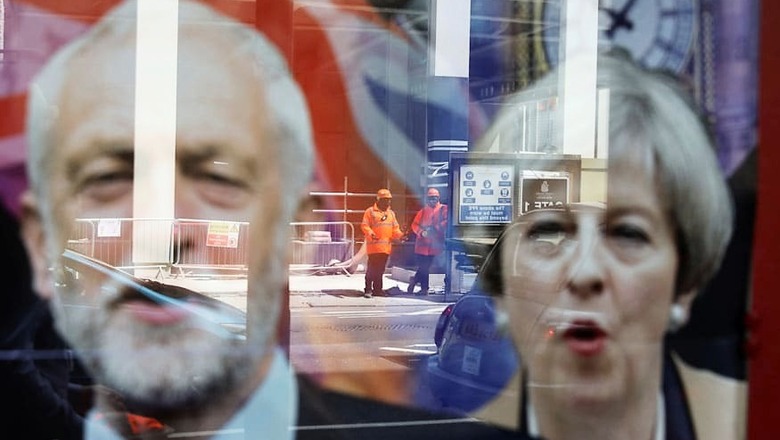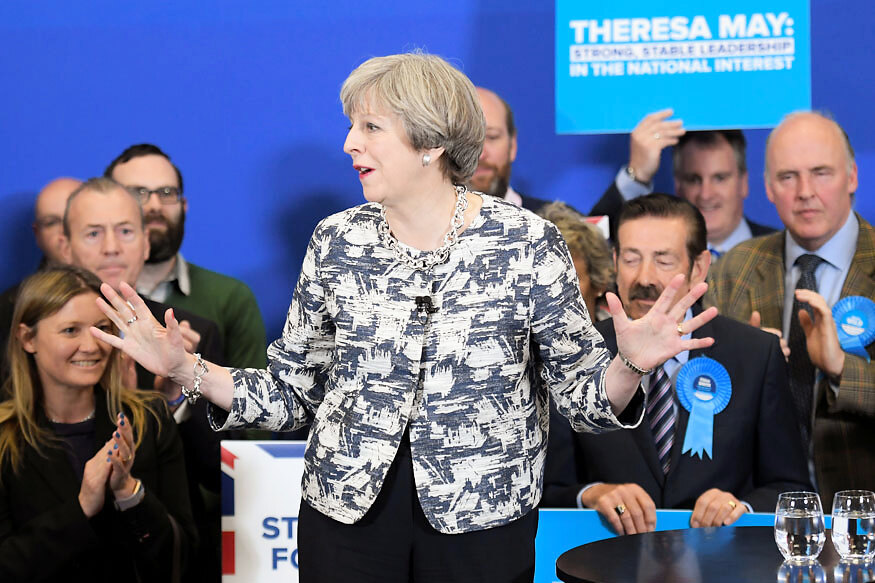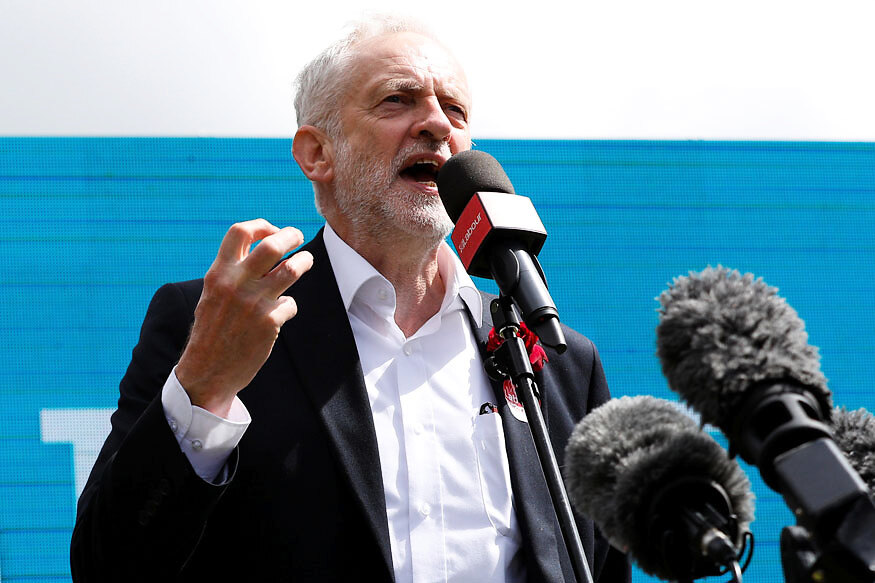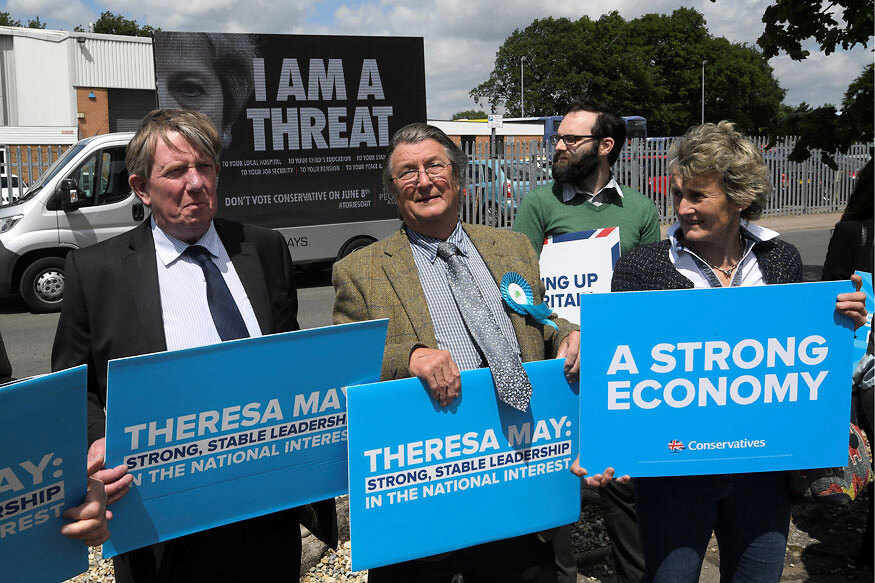
views
London: Campaigning in Britain's turbulent general election that has been darkened by two jihadist attacks wrapped up Wednesday, leaving forecasters struggling on the eve of voting to predict an outcome.
Conservative Prime Minister Theresa May and main opposition Labour leader Jeremy Corbyn criss-crossed the country, targeting urban areas whose votes could be crucial.
But the impact of Saturday's attack in London was not far from focus. Police said the toll had risen to eight after a body had been recovered from the River Thames in the search for a Frenchman missing since the rampage.
The family of a Spanish man who used his skateboard to defend a woman from one of the assailants also confirmed on Wednesday that he had died.
Meanwhile, a 30-year-old man was arrested in east London Wednesday in connection with the attack, which also left 48 people injured.
The prime minister stunned Britain on April 18 when she announced a snap election, hoping to transform a massive opinion-poll lead into an equally huge majority in the House of Commons, where she holds a slim 17-seat advantage in the 650-member legislature.

But the political ground began to shift under her feet, moving from Brexit -- May's strongest card -- to domestic policy and her own record on security, both of them favouring Corbyn.
Opinion polls -- hampered by a poor reputation for reliability -- predict a May win.
Pollsters YouGov on Wednesday gave the Conservatives a seven-point lead over Labour, while ICM put May's party 12 points ahead.
Survation, another polling company, had on Monday forecasted a narrower gap of just one point.
May is fighting to push her message that she is a "strong and stable" leader compared with Corbyn, able to fight Britain's corner in Brussels, where formal Brexit talks are due to start on June 19.
"Who do you trust to have the strong and stable leadership to get the best deal for Britain in Europe?" she asked voters in Birmingham on Wednesday.
An upbeat Corbyn said the party's chances had been underestimated, as he promised to reverse cuts rolled out under the Conservatives.
"We've changed that debate and given people hope. Hope it doesn't have to be like this. Inequality can and will be tackled. Hope that austerity can be ended," he told supporters at his homecoming rally in London.
- Corbyn gains? -
Despite being seen as an unlikely leader -- one who has had to face off a rebellion by his own MPs -- Corbyn has gained momentum during the election campaign and regularly attracts big crowds to his rallies.
Labour gained a boost after the May 18 release of the Conservatives' manifesto, outlining elderly care costs which the tabloids dubbed the "dementia tax".
The pledge hit the party's core supporters and May was forced to backtrack on capping the costs, prompting further criticism that she was unreliable.

Corbyn then found a valuable seam in attacking May on security, an area where the Conservatives traditionally are far stronger than Labour in voters' minds.
A string of terror attacks have occurred since May became prime minister last July, and she was interior minister for six years before she rose to the top job.
Corbyn attacked her for slashing police numbers during her ministerial spell, and vowed to hire more police for neighbourhood patrols.
University of London professor Eric Kaufmann said that while the outcome could hinge on the turnout among young voters -- believed to be overwhelmingly pro-Labour -- traditionally British youth did not rush to the polls in great numbers.
"There's no obvious reason why that would rebound," he said. "I'm sort of with the general polls which suggest that the Tories will increase their majority by around 25 seats."
- Security questions -
Questions are also being raised about the vaunted image of Britain's security services. Three terror attacks have taken place since March, leaving 34 dead and around 200 injured, and all involved assailants who were known to the authorities.
In the most recent attack, eight people were killed on Saturday when three men aboard a hired van ploughed into pedestrians on London Bridge and went on a stabbing spree before being shot dead by police.

Attacker Khuram Shazad Butt was known to British intelligence services, while an Italian prosecutor said Britain had been notified that one of his accomplices, Youssef Zaghba, was a "possible suspect" back in March 2016.
Their rampage followed a similar attack next to the British parliament in March, in which assailant Khalid Masood was shot after killing five people.
In the most deadly attack, Salman Abedi killed 22 people at a Manchester concert venue on May 22 when he detonated a suicide bomb.
In the wake of the latest attack, London Mayor Sadiq Khan said there had been a fivefold increase in anti-Muslim crimes. Writing on Facebook, Khan said the city would take a "zero-tolerance approach to hate crime" in the British capital.
Police forces around Britain have reviewed security arrangements for election day. London's Metropolitan Police said there would be a "specialist and highly flexible operation in place that can deploy and respond as needed".

















Comments
0 comment